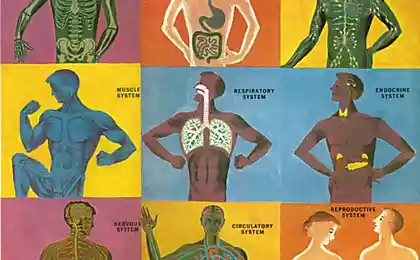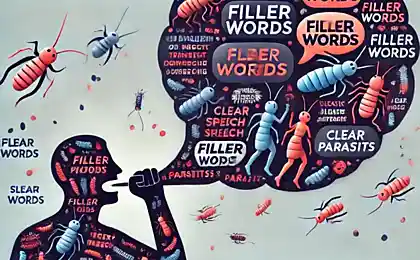1073
They characterize a man of his word – parasites
Surely you have met people that in his speech, almost every sentence, using unnecessary and meaningless in this context, the so-called word – parasites.
And it can be absolutely decent words: type, anyway, so, like, in General, that is, well.... and many others. But when they are repeated too often, clog up it and go into the category of parasites.
Did you know that according to psychologists, these words can tell a lot about a person? Because as a man thinks, so he speaks. And these words sometimes give what the source is silent.
So what's behind these words?

"In short" – often uses unstable and sometimes prone to aggression of the person with a choleric temperament. Sometimes the word indicates excessive talkativeness.
Another "weed" in a word, the characteristic of too talkative and expressive people is "so to speak". So as the thoughts these people have sometimes not kept pace with the words, "so to speak" acts as a pause and gives the ability to synchronize the thinking and speech.
The word "look" often uses man – vizual, who wants it said better understand.
Similarly behaves the auditory, who frequently says , "listen", thereby urging the interlocutor to be more attentive to him said.
"All right" often say people familiar with the feeling of superiority over the interlocutor, but do not want to show it.
"This is...", "well...", "uh", "this thing" – in front of you slow on the uptake man, slow-witted, poorly educated, which is difficult to speak coherently.
Some people are in a state of great excitement starts to use in his speech, the particle "nu". Knowing this, we can understand that a person is worried about something, but he doesn't want to talk about it.
The words "here" or "there" is often said at the end those who are bored with the conversation or the person does not know what else to say.
Very common in our days, "as if" often suggests that the speaker avoids responsibility. "As if" is a loophole, leaving the possibility of maneuvering.
Some people almost every sentence beginning with the particle "no". Linguists believe that the habit of "deny affirmative" goes back to those days, when speaking in this way sought to protect his claim from the evil eye. "No, I agree, let's go to the movies."
"Well," also originates in ancient times. Linguists believe that in those days the word "well" used to be something to force the interlocutor. In all likelihood, the person constantly uses the particle "well", the unconscious seeks to give his words more importance and encourages the interlocutor to a more active dialogue.
"In fact" – an expression of the inherent self-assured nerds who love to read notation and consider their opinion the only right one.
"By the way" – like to say the timid people who don't want to look like a man of few words, but also embarrassed to be the center of attention.
"You know" – the person timid, insecure, constantly apologizes.
"Actually" is also inherent in insecure people. But these people hide their insecurities with aggression and can make a scene at the slightest provocation.
Also interesting: 8 of the words that is to say less
Respect your words!
And to finish our talk about words – parasites I want a funny poem by E. moshkovskaya:
There was one of those
Well, then, and
It lived the
With his mother.
There was another queer
This is in General so
And his favorite son-in-law.
Called son-in-law
So to speak.
And his wife's name was well...
A neighbor called it...
And his parents
You see
And you see...
And some uh-uh
He lived on the top floor...
And friends they all...
So, in General.
published
Author: Mkrtchyan, Elina
P. S. And remember, only by changing their consumption — together we change the world! ©
Source: v-garmonii-s-soboi.ru/sila-myisli-i-slova/kak-slova-parazityi-harakterizuyut-cheloveka
And it can be absolutely decent words: type, anyway, so, like, in General, that is, well.... and many others. But when they are repeated too often, clog up it and go into the category of parasites.
Did you know that according to psychologists, these words can tell a lot about a person? Because as a man thinks, so he speaks. And these words sometimes give what the source is silent.
So what's behind these words?

"In short" – often uses unstable and sometimes prone to aggression of the person with a choleric temperament. Sometimes the word indicates excessive talkativeness.
Another "weed" in a word, the characteristic of too talkative and expressive people is "so to speak". So as the thoughts these people have sometimes not kept pace with the words, "so to speak" acts as a pause and gives the ability to synchronize the thinking and speech.
The word "look" often uses man – vizual, who wants it said better understand.
Similarly behaves the auditory, who frequently says , "listen", thereby urging the interlocutor to be more attentive to him said.
"All right" often say people familiar with the feeling of superiority over the interlocutor, but do not want to show it.
"This is...", "well...", "uh", "this thing" – in front of you slow on the uptake man, slow-witted, poorly educated, which is difficult to speak coherently.
Some people are in a state of great excitement starts to use in his speech, the particle "nu". Knowing this, we can understand that a person is worried about something, but he doesn't want to talk about it.
The words "here" or "there" is often said at the end those who are bored with the conversation or the person does not know what else to say.
Very common in our days, "as if" often suggests that the speaker avoids responsibility. "As if" is a loophole, leaving the possibility of maneuvering.
Some people almost every sentence beginning with the particle "no". Linguists believe that the habit of "deny affirmative" goes back to those days, when speaking in this way sought to protect his claim from the evil eye. "No, I agree, let's go to the movies."
"Well," also originates in ancient times. Linguists believe that in those days the word "well" used to be something to force the interlocutor. In all likelihood, the person constantly uses the particle "well", the unconscious seeks to give his words more importance and encourages the interlocutor to a more active dialogue.
"In fact" – an expression of the inherent self-assured nerds who love to read notation and consider their opinion the only right one.
"By the way" – like to say the timid people who don't want to look like a man of few words, but also embarrassed to be the center of attention.
"You know" – the person timid, insecure, constantly apologizes.
"Actually" is also inherent in insecure people. But these people hide their insecurities with aggression and can make a scene at the slightest provocation.
Also interesting: 8 of the words that is to say less
Respect your words!
And to finish our talk about words – parasites I want a funny poem by E. moshkovskaya:
There was one of those
Well, then, and
It lived the
With his mother.
There was another queer
This is in General so
And his favorite son-in-law.
Called son-in-law
So to speak.
And his wife's name was well...
A neighbor called it...
And his parents
You see
And you see...
And some uh-uh
He lived on the top floor...
And friends they all...
So, in General.
published
Author: Mkrtchyan, Elina
P. S. And remember, only by changing their consumption — together we change the world! ©
Source: v-garmonii-s-soboi.ru/sila-myisli-i-slova/kak-slova-parazityi-harakterizuyut-cheloveka
Graceful Grasshopper electric bike Concept Bike
Three catch Elon musk. Like taking a job at Tesla Motors
























